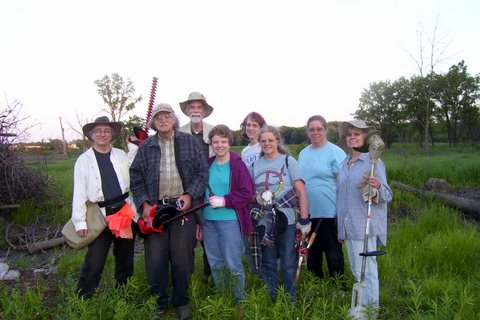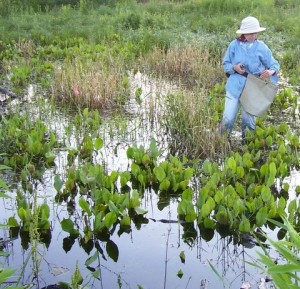About STPS
Save the Prairie Society (STPS) was chartered in 1975 as a non-for-profit organization. Since then, dedicated volunteers have worked to preserve and restore the 80 acre Wolf Road Prairie and bufferlands in Westchester, Cook County, Illinois. STPS partners with the Illinois Department of Natural Resources, the Forest Preserve District of Cook County and the Illinois Nature Preserves Commission to promote and protect the natural resources of Wolf Road Prairie and the c.1850’s Franzosenbusch Prairie House Nature Center and Museum located at the north end of the preserve.
STPS believes it is critical to save natural areas and wildlife habitat. Saving natural areas as “living museums” ensures a wilderness experience for visitors and connects people with their natural heritage. Today, less than 1/100th of 1% of high quality original prairie remains in Illinois. These sobering statistics establish the rarity of the Wolf Road Prairie landscape and identify why the primary purpose of STPS is to work toward its protection and restoration.
In 1993, Save the Prairie Society launched the Natural Areas Rescue Fund (NARF), a land acquisition project to save imperiled “orphan” natural areas and threatened and endangered species and to offer new choices and solutions to halt and reverse the loss of biodiversity in Illinois. NARF has been involved in saving four natural areas — Macoupin Woods, Mineral Marsh, Hancock Savanna and Tomlin Timber Nature Preserve
The Role of Save the Prairie Society at Wolf Road Prairie Involves:
Land Protection:
As an owner of buffer properties at Wolf Road Prairie, our purpose is to protect the biodiversity, wildlife and watershed of the preserve and to work with the Illinois Department of Natural Resources and the Forest Preserve District of Cook County as advocates and stewards for the site.
In pre-settlement times, Illinois was a vast wilderness of prairies, savannas, forests, wetlands and waterways. These native ecosystems were maintained through natural processes and interactions between plants, animals, birds, insects and the Native American peoples who inhabited the land. Today, remnant natural areas are fragmented and require human intervention to retain biological diversity. Invasive species must be controlled and the land cared for and periodically burned. Such restoration practices are conducted by volunteers and professionals to keep Wolf Road Prairie healthy and thriving.
Education
Wolf Road Prairie is a popular destination for nature studies, tours, field trips, programs and events for children, teachers and adults. Volunteers and experts inspire visitors to learn about and appreciate nature through personal experience.
Prairie House
The historic c.1850’s Franzosenbusch Prairie House contains within its walls a remnant of the first Lutheran schoolroom and teacher’s quarters in Proviso Township. The Prairie House is being restored as a nature center and museum where exhibits will be featured and activities and events held to promote the natural and human history of Wolf Road Prairie and the geographic area. Prior to settlement, the historic boundaries of the Potawatomi village of Sauganakka covered an extended area in DuPage and Cook counties which included portions of Wolf Road Prairie and bufferlands. After 1833, most Native peoples were displaced from the Illinois territory, but some remained in the area and traded with the early settlers.
Volunteer Opportunities
Scout groups, students, corporate employees and individuals find it rewarding to be involved in the many tasks of stewardship at Wolf Road Prairie. Many thousands of hours have been donated to cutting and hauling invasive brush, pulling weeds, collecting and scattering seeds and working at the Prairie House and gardens.
Eco-Tourism
Wolf Road Prairie is attracting visitors locally as well as from foreign lands. The preserve is known as the place to go for birding, wildlife watching or just to experience the natural heritage of Illinois.
In addition to our role at Wolf Road Prairie, STPS established the Natural Areas Rescue Fund (NARF). NARF was created to offer new choices and solutions to halt and reverse the loss of biodiversity in Illinois at the grassroots level. NARF has been involved in saving four natural areas in Illinois — Macoupin Woods, Mineral Marsh, Hancock Savanna and Tomlin Timber.
Donations to STPS are tax deductible to the full extent of the law. Nearly 100% of contributions received are allocated to land protection, native ecosystem restoration, community outreach and conservation and historic education programs and events.
